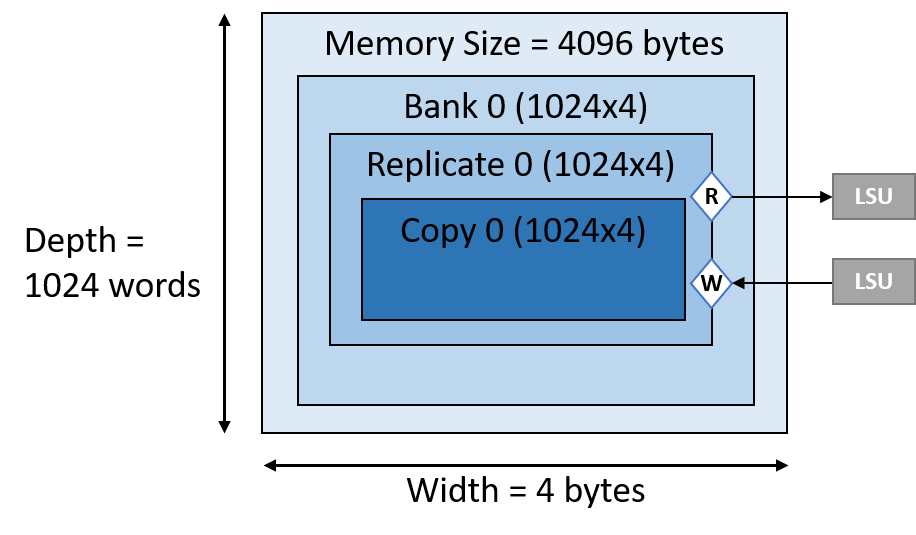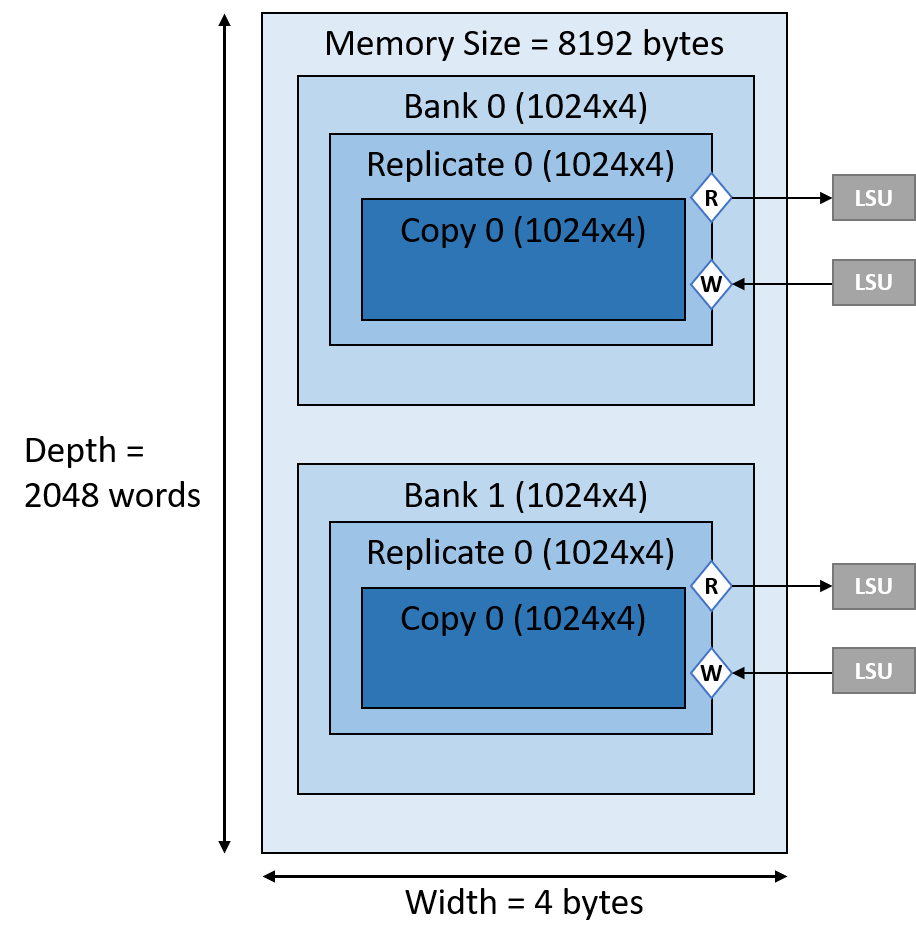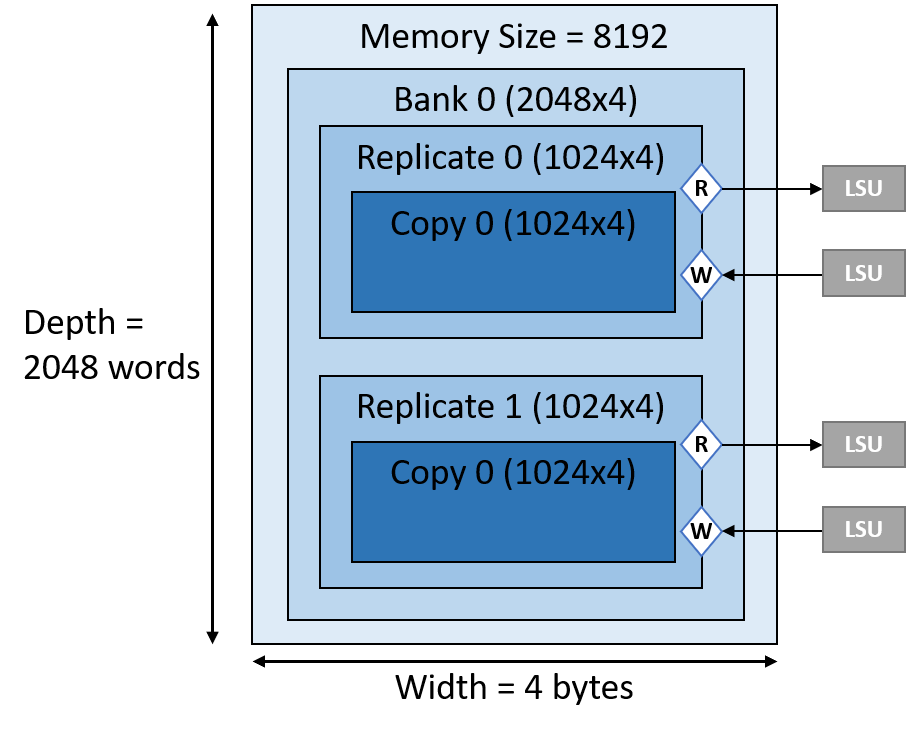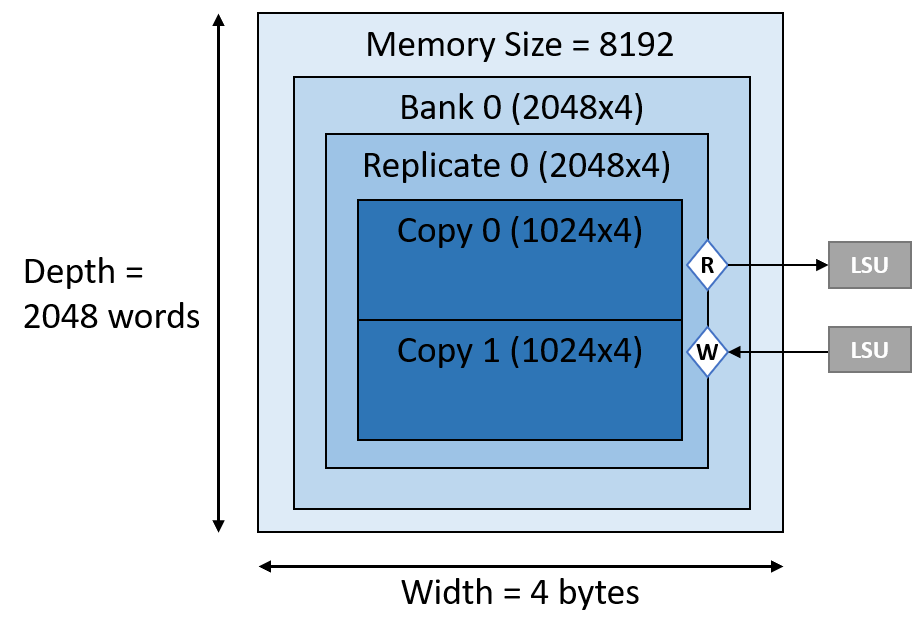5. Component Memories (Memory Attributes)
The Intel® High Level Synthesis (HLS) Compiler builds a hardware memory system using FPGA memory resources (such as block RAMs) for any local, constant, static variable or array, and slave memory declared in your code. Memory accesses are mapped to load-store units (LSUs), which transact with the hardware memory through its ports.
The following diagram shows a basic memory configuration:

The contents of a memory system can be partitioned into one or more memory banks, such that each bank contains a subset of data contained in the hardware memory:

A memory bank can contain one or more memory replicates. The compiler might create memory replicates to create more read ports. Having more read ports allows faster access to your memory system if you have many read operations.
The replicates in a memory bank contain identical data and you can read from the replicates simultaneously. A replicate can have two or four access ports, depending on whether the replicate is clocked at the same frequency (single pumped) or twice the frequency (double pumped) of the component. All ports in replicates can be accessed concurrently. The number of ports in a memory bank depends on the number of replicates that the bank contains.


The Intel® HLS Compiler can control the geometry and configuration parameters of the hardware memories that it builds. The compiler tries to create stall-free memory accesses. That is, the compiler tries to give memory reads and writes contention-free access to a memory port. A memory system is stall-free if all reads and writes in the memory system are contention-free.
The compiler tries to create a minimum-area stall-free memory system. If you want a different area-performance trade off, use the component memory attributes to specify your own memory system configuration and override the memory system inferred by the compiler.
Component Memory Attributes
Apply the component memory attributes to local variables and static variables in your component to customize the on-chip memory architecture of the component memory system and lower the FPGA area utilization of your component. You cannot apply memory attributes to constants, slave memories, or struct data members.
These component memory attributes are defined in the "HLS/hls.h" header file, which you can include in your code.
| Memory Attribute | Description |
|---|---|
| hls_register | Forces a variable or array to be carried through the pipeline in registers. A register variable can be implemented either exclusively in flip-flops (FFs) or in a mix of FFs and RAM-based FIFOs. |
| hls_memory | Forces a variable or array to be implemented as embedded memory. |
| hls_singlepump | Specifies that the memory implementing the variable or array must be clocked at the same rate as the component accessing the memory. |
| hls_doublepump | Specifies that the memory implementing the variable or array must be clocked at twice the rate as the component accessing the memory. |
| hls_numbanks | Specifies that the memory implementing the variable or array must have a defined number of memory banks. |
| hls_bankwidth | Specifies that the memory implementing the variable or array must have memory banks of a defined width. |
| hls_bankbits | Forces the memory system to split into a defined number of memory banks and defines the bits used to select a memory bank. |
| hls_numports_readonly_writeonly | Specifies that the memory implementing the variable or array must have a defined number of read and write ports. |
| hls_simple_dual_port_memory | Specifies that the memory implementing the variable or array should have no port that services both reads and writes. |
| hls_merge (depthwise) | Allows merging two or more local variables to be implemented in component memory as a single merged memory system in a depth-wise manner. |
| hls_merge (widthwise) | Allows merging two or more local variables to be implemented in component memory as a single merged memory system in a width-wise manner. |
| hls_init_on_reset | Forces the static variables inside the component to be initialized when the component reset signal is asserted. |
| hls_init_on_powerup | Sets the component memory implementing the static variable to initialize on power-up when the FPGA is programmed. |
| hls_max_concurrency | Specifies the memory has a defined maximum number of private copies to allow concurrent iterations of a loop at any given time. |
Constraints on Attributes for Memory Banks
The properties of memory banks constrain how you can divide component memory into banks with the memory bank attributes.
- The number of bytes in your array that you want to access at one time (S). If you are accessing a local variable, this value represents the size (in bytes) of the local variable.
- The number of memory banks specified by hls_numbanks attribute ().
- The width (in bytes) of the memory banks specified by hls_bankwidth attribute ().
- The number of memory bank-select bits specified by hls_bankbits attribute. That is, n+1 when you specify b 0 , b 1 , ..., b n as the bank-select bits ().
-
The number of bytes accessed concurrently (or size of a local variable) is equal to the number of memory banks it uses times the width of the memory banks.
- must be a power of 2 value.
-
bank-selection bits that are required to address number of memory banks.
Values that you specify for the hls_numbanks, hls_bankwidth, and hls_bankbits attributes must meet these constraints. For attributes that you do not specify, the Intel® HLS Compiler infers values for the attributes following these constraints.